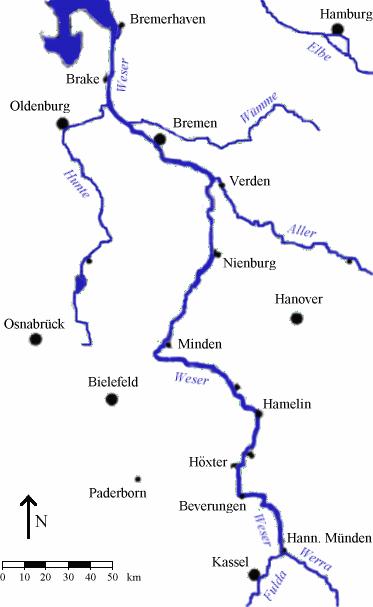Battle of Hastenbeck
|
|
| Battle of Hastenbeck | |||||||||||||||||
|---|---|---|---|---|---|---|---|---|---|---|---|---|---|---|---|---|---|
| Conflict | Seven Years' War | ||||||||||||||||
| Date | July 26, 1757 | ||||||||||||||||
| Place | Near the village of Hastenbeck, southeast of Hamelin | ||||||||||||||||
| Result | French victory, leading to the defeat of the Electorate of Hanover | ||||||||||||||||
| |||||||||||||||||
The Battle of Hastenbeck took place during the Seven Years' War on July 26, 1757, near the village of Hastenbeck (close to Hamelin). The allied forces of Electorate of Hanover, Hessian and Brunswick were defeated by the French army, finally resulting in the Convention of Klosterzeven and the occupation of Hanover.
The French, who were allied with Austria, Russia, Sweden and Saxony, invaded Germany in April 1757 with two armies, altogether about 100,000 soldiers. The French hoped to draw the attention of Prussia, which was allied with England and Hanover, away from the Bohemian theatre where Prussia and Austria fought several battles (Battle of Lobositz, Battle of Prague, Battle of Kolin). The Battle of Hastenbeck is one of the most curious battles in history, since both commander-in-chief thought that they lost the battle and were already starting to withdraw from the battlefield.
One of the two French armies under command of Prince de Soubise marched through central Germany. They joined the so called "Reichsarmee" commanded by Prinz von Hildburghausen. This coalition army later met a Prussian army at the Battle of Rossbach on November 5 1757 with disaster.
The other French army commanded by Marshal Louis Charles d'Estrées consisted of about 50,000 infantry, 10,000 cavalry and 68 cannons. The army advanced towards the Electorate of Hanover. Prussia was heavily involved with its enemies Austria, Russia and Sweden and therefore was not able to help on the western front. This task was given to the Hanoverian Army of Observation which only had little support from Prussia, namely six Prussian battalions. The main part of the "Hanoverian Army of Observation" came from Hanover (about 60%) and Hesse (about 25%), smaller additional forces from Brunswick and Prussia. The total strength of the Hanoverian Army of Observation was about 40,000 men (note: the sources differ here between 36,000 and 47,000). The army was commanded by William Augustus the Duke of Cumberland who was a son of King George II of Great Britain.
Hanover refused to defend the river Rhine which is farther to the west than the river Weser. This left the Prussians no choice than to abandon their fortress in Wesel and to give up the line of the Lippe river in April. Cumberland's main objective was preventing the occupation of Hanover. He first concentrated his army at Bielefeld, and then after a brief stand in Brackwede, Cumberland decided to cross the Weser south of Minden. The main idea was to use the Weser as a natural defense line and to make it impossible for the French troops to cross the river. The Duke of Cumberland deployed his main forces at Hamelin which is a couple of kilometers to the northwest from Hastenbeck and left the Prussian battalions as garrison forces to Minden. He also deployed small patrols all along the Weser. Meanwhile the French sent a detachment to the North to capture Emden on July 3, which was an important access point for Britain to Europe. Later they sent another detachment to the south which took Kassel on July 15.
During the night of July 7 a strong French advance guard crossed the river Weser close to the town Beverungen. While the river Weser normally cannot be easily forded, during the summer the water level drops down to a low of 80 cm (~3 feet) between Münden and Hameln, making it possible for infantry and cavalry to cross. The French advance troops then marched to the north and established a bridgehead at Höxter. The main army crossed the river Weser on July 16 leaving the Duke of Cumberland no choice than to deploy his troops south of Hamelin and to engage d'Estrées. Unfortunately for him Frederick the Great lost in the meantime the Battle of Kolin against Austria and therefore needed his additional battalions back.
During the battle Hastenbeck was almost completely destroyed, only the church, the manse and the farm house were not destroyed.de:Schlacht bei Hastenbeck fr:Bataille de Hastenbeck

